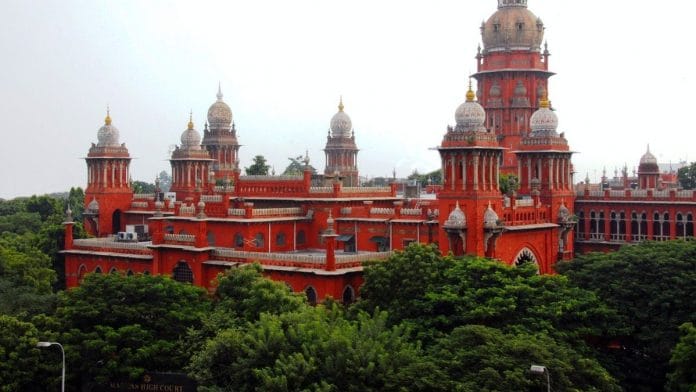New Delhi: In a significant judgment, the Madurai bench of the Madras High Court Tuesday directed prison authorities to ensure that meetings between prisoners and their spouses are arranged in a “reasonably private setting”.
Relying on the celebrated right to privacy judgment as well as the Section 377 judgment to highlight recognition of dignity as a human right, Justice G.R. Swaminathan observed, “When a prisoner meets his wife, he may like to hold her hands. His emotions are bound to be find a physical expression.
“While private prison cottages may be a distant prospect, the privacy and dignity of the prisoners should be scrupulously protected. Conversations between prisoner and his spouse should be unmonitored,” added Swaminathan.
The court was hearing a petition filed for a bomb blast case accused, Mohamed Shalin, to meet his ailing wife in Tirunelveli. The petition, filed by Shalin’s sister, was opposed by the additional public prosecutor on several grounds, including the fact that the allegations against the accused had national security implications and were grave in nature.
The court, however, did not agree with this and directed the prison authorities to escort the accused to his wife. In doing so, it asserted that a prisoner is entitled to certain fundamental rights — enshrined under Article 21 of the Constitution — even while in custody, and expressly recognised the right of a prisoner to meet their spouse in private.
Currently, under Rule 531(2) of the Tamil Nadu Prison Rules, prison authorities are supposed to remain present for every prisoner interview.
As it read down the provision, the court directed the authorities to carve an exception for spousal meetings. It added that both the prisoner and the spouse should be carefully searched before and after the interview.
Also read: Sharing social media posts akin to endorsing them, says Madras High Court
Prisoners’ right to procreate
The court relied on a Punjab and Haryana High Court judgment passed in 2015, when Justice Surya Kant had recognised the prisoners’ right to procreate. The court had advocated for appropriate legislation or policy framework to treat conjugal visits of married and eligible convicts as valid ground for their temporary release on parole or furlough.
According to advocate Arjun Sheoran, who represented the complainant in the Punjab and Haryana High Court case, several prisoners have since been granted parole for conjugal visits.
Additionally, the Punjab Good Conduct Prisoners (Temporary Release) Act, 1962 has also been amended to allow temporary release of prisoners for “delivery of child by the wife of the prisoner”.
However, according to Sheoran, no such facilities have been made available within the prisons as of now.
“It is very unfortunate that despite the path-breaking judgment by Hon’ble Justice Surya Kant back in 2015, the states of Punjab, Haryana and Chandigarh have failed to implement the positive directions for prison reform and for ensuring conjugal rights of prisoners. As per my knowledge no prison reforms committee under a HC judge was formed and none of the other directions were implemented,” said Sheoran.
“The prisoners have been filing petitions before the HC and some have been able to get relief but there is still no institutionalized mechanism for ensuring conjugal rights of prisoners which are necessary for dignity, privacy and is a basic human right,” he added.
Nevertheless, change might be in the offing, with the Supreme Court having constituted a committee last year headed by Justice Amitava Roy to look into jail reforms.
Also read: Rs 95 lakh to Rs 9 crore: SC fines got its legal aid agency 10 times more cash in 2018-19






